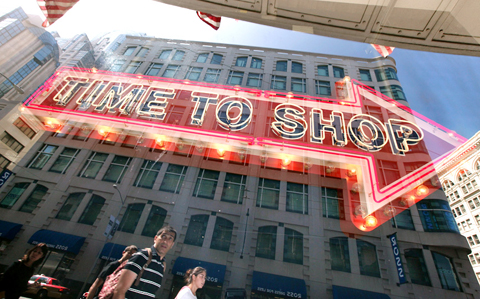Americans’ pessimism about the economy appears to be lifting, with consumer expectations for the next six months hitting their most positive point since the recession began.
The improvement stems partly from the housing market, as a national gauge of home prices on Tuesday posted its first quarterly increase in three years.
The consumer and housing reports, along with US President Barack Obama’s reappointment of Ben Bernanke as Federal Reserve chief, sent the financial markets modestly higher on Tuesday.

PHOTO: AFP
However, economists warned that consumer confidence remains far below levels associated with a healthy economy and might not lead to the increased spending critical for a broad recovery.
“People’s spending decisions depend more on whether they have money in their pocket than on how they feel,” said Bill Cheney, chief economist at John Hancock Financial.
Still, Cheney and other economists said Tuesday’s report on consumer sentiment was encouraging.
The New York-based Conference Board said its Consumer Confidence index rose to 54.1, from an upwardly revised 47.4 last month.
That reading reversed two months of decline and easily beat analysts’ expectations.
Economists closely monitor confidence because consumer spending accounts for about 70 percent of US economic activity. Consumer sentiment, fueled by signs the economy is stabilizing, has recovered a bit since hitting a record-low of 25.3 in February.
A reading of 90 indicates the economy is on solid footing; anything above 100 signals strong growth.
Consumers’ expectations for the economy over the next six months rose to 73.5 from 63.4 last month, the highest level since December 2007, when the recession began. The consumer confidence survey was sent to 5,000 households and had a cutoff date for responses of Tuesday last week.
More consumers said they were likely to buy a home or a car within the next six months than said so last month’s survey. The outlook for jobs also improved, albeit from very low levels.
The housing sector received positive news, too.
The Standard Poor’s/Case-Shiller’s US National Home Price Index rose 1.4 percent in the second quarter from the January-March period, the first quarterly increase in three years. Home prices, though still down nearly 15 percent from last year, are at levels last seen in early 2003.
The US Commerce Department was scheduled yesterday to report new-home sales for last month. Analysts also expect that figure to rise.
Higher home prices would help consumers, who are saving more and spending less as their wealth plummets during the longest recession since World War II.
Falling home prices and dwindling stock portfolios made many people, even those with jobs, feel poorer.
“An upturn in prices has to ease some of the pain and may even get some people to loosen up on their wallets a touch,” Joel Naroff, chief economist at Naroff Economic Advisors, wrote in a note to clients.
“An improving housing market coupled with better consumer spending could ensure that the recovery takes hold,” he wrote.

MORE VISITORS: The Tourism Administration said that it is seeing positive prospects in its efforts to expand the tourism market in North America and Europe Taiwan has been ranked as the cheapest place in the world to travel to this year, based on a list recommended by NerdWallet. The San Francisco-based personal finance company said that Taiwan topped the list of 16 nations it chose for budget travelers because US tourists do not need visas and travelers can easily have a good meal for less than US$10. A bus ride in Taipei costs just under US$0.50, while subway rides start at US$0.60, the firm said, adding that public transportation in Taiwan is easy to navigate. The firm also called Taiwan a “food lover’s paradise,” citing inexpensive breakfast stalls

TRADE: A mandatory declaration of origin for manufactured goods bound for the US is to take effect on May 7 to block China from exploiting Taiwan’s trade channels All products manufactured in Taiwan and exported to the US must include a signed declaration of origin starting on May 7, the Bureau of Foreign Trade announced yesterday. US President Donald Trump on April 2 imposed a 32 percent tariff on imports from Taiwan, but one week later announced a 90-day pause on its implementation. However, a universal 10 percent tariff was immediately applied to most imports from around the world. On April 12, the Trump administration further exempted computers, smartphones and semiconductors from the new tariffs. In response, President William Lai’s (賴清德) administration has introduced a series of countermeasures to support affected

CROSS-STRAIT: The vast majority of Taiwanese support maintaining the ‘status quo,’ while concern is rising about Beijing’s influence operations More than eight out of 10 Taiwanese reject Beijing’s “one country, two systems” framework for cross-strait relations, according to a survey released by the Mainland Affairs Council (MAC) on Thursday. The MAC’s latest quarterly survey found that 84.4 percent of respondents opposed Beijing’s “one country, two systems” formula for handling cross-strait relations — a figure consistent with past polling. Over the past three years, opposition to the framework has remained high, ranging from a low of 83.6 percent in April 2023 to a peak of 89.6 percent in April last year. In the most recent poll, 82.5 percent also rejected China’s

PLUGGING HOLES: The amendments would bring the legislation in line with systems found in other countries such as Japan and the US, Legislator Chen Kuan-ting said Democratic Progressive Party (DPP) Legislator Chen Kuan-ting (陳冠廷) has proposed amending national security legislation amid a spate of espionage cases. Potential gaps in security vetting procedures for personnel with access to sensitive information prompted him to propose the amendments, which would introduce changes to Article 14 of the Classified National Security Information Protection Act (國家機密保護法), Chen said yesterday. The proposal, which aims to enhance interagency vetting procedures and reduce the risk of classified information leaks, would establish a comprehensive security clearance system in Taiwan, he said. The amendment would require character and loyalty checks for civil servants and intelligence personnel prior to